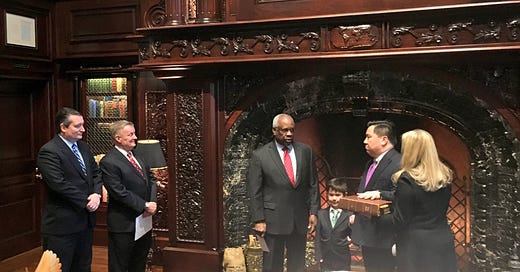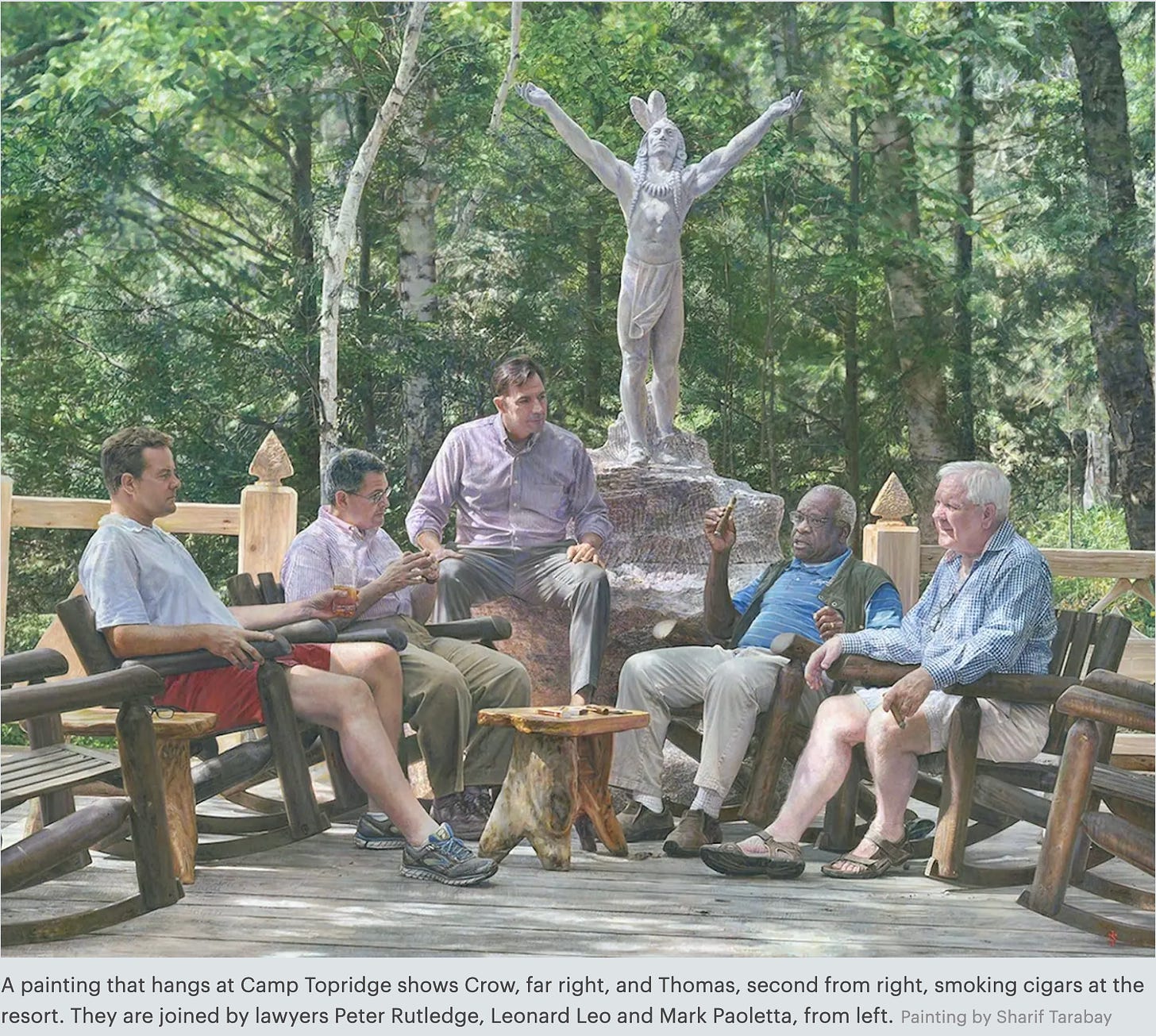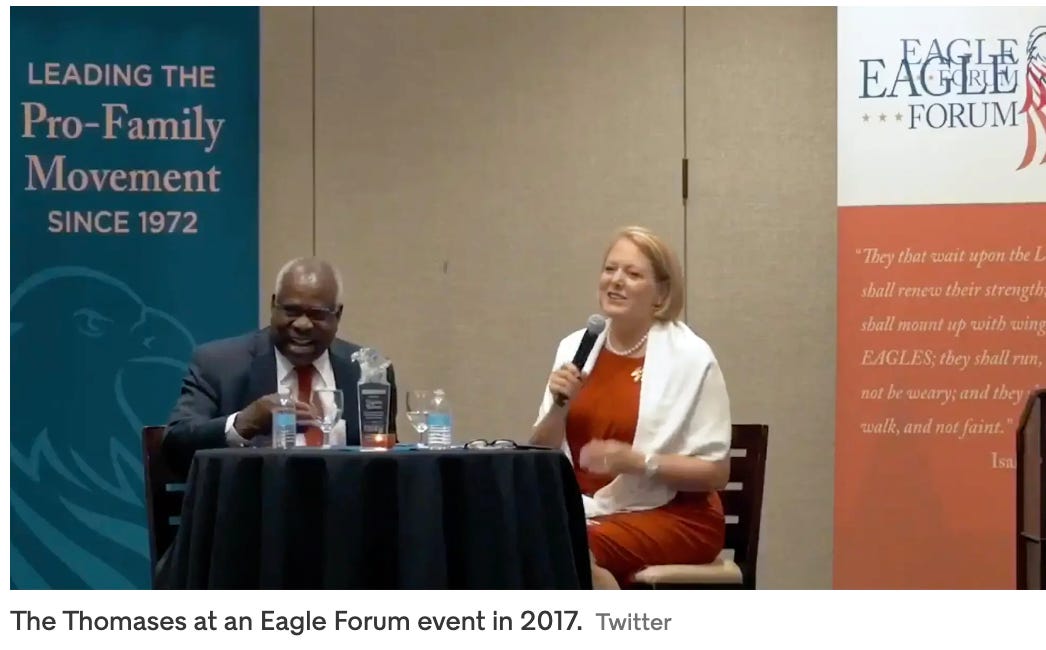The Supreme Court's ethics problem is a credibility problem
It is too easy for rich donors to lobby the court
Take a look at this picture. It conveys much of why the Supreme Court’s decline in legitimacy is merited. In 2018, a Supreme Court Justice, Clarence Thomas, is swearing in a 5th Circuit Judge (and potential future SCOTUS pick) James Ho, with Senator Ted Cruz standing nearby.
Unremarkable enough, so far. If you have heard of Ho, a former Thomas clerk, it may because he is one of two conservative justices who are boycotting hiring law students from schools he views as not being sufficiently friendly to conservatives. Their pledge is to fight viewpoint discrimination with…uh…hiring discrimination.
So lets add some context to make the significance clearer.
Where did the swearing in occur?
At the private library of a GOP mega-donor Harlan Crow. Crow has donated $10 million in disclosed political contributions, plus an unknown amount in undisclosed donations, helped found and fund conservative organizations such as the Club for Growth. He is, by any measure, someone who has used his wealth and power to shape American politics and jurisprudence.
If it seems remarkable that the swearing in of public officials are being held at the residences of partisan money men, it gets worse. It seems very likely that Thomas was flown down by the Crow from DC on his private jet. And did not report this gift, in conflict with federal law. And that this was merely one of the smaller incidents in a decades-long relationship where Thomas and his wife were gifted lavish vacations that he failed to report. One such gift, which involved a private jet to Indonesia, and an island hopping-vacation on a yacht was estimated to be worth $500,000.
Since Thomas did not disclose these gifts, how do we know about them? The bombshell revelations came from a team of ProPublica reporters: Joshua Kaplan, Justin Elliott and Alex Mierjeski, who painstakingly documented this relationship, even chasing down yacht workers to fill in the gaps that Thomas conspicuously failed tor report. We only have the picture of the swearing-in because Ted Cruz tweeted out, oblivious or indifferent to any ethical concerns about what was happening.
How political activists take advantage of lax ethical standards
I work in Washington DC, and occasionally interact with federal employees. One thing you learn very quickly is that they have strong ethics rule. If you offer to buy them lunch, it can’t be worth more than $20. They cannot accept more than $50 worth of gifts from any single source in a given year. The numbers are low but the logic is clear: public employees are less credible as disinterested implementers of the law if they can be wined and dined by private actors.
The rules are less strict for judges. They are obliged to report gifts over $415, but allowed to accept free food and lodging. While this carveout is intended to avoid justices having to fill out documentation if they dine or stay with friends, it allows those who wish to spend time with judges to dangle much more glamorous inducements.
Some judges take advantage of this perk of the job. For example, Justice Scalia took 258 privately funded trips over 11 years. Some of these trips are defensible, say a judge giving a public talk at a university. But many are funded by conservative donors or organizations like the Federalist Society. They offer no public access, are experienced as lavish private vacations by the judges, and an opportunity for lobbying by the donors. (To be clear, ferrying Justices around on private jets and yachts are not covered, and it seems clear that Thomas violated federal law by not reporting these gifts).
In theory, Judges cannot accept gifts from someone with a case before the courts. But Scalia died at a private hunting lodge of a businessman whose company had recently had business before SOCTUS. He also refused to recuse himself from a case involving Vice-President Cheney even though the two had gone hunting together as the case was coming before the court. Both Thomas and Scalia refused to recuse themselves from the Citizens United case, even though they had accepted gifts from the Koch brothers, who had a very clear position on the case, and benefited greatly from the decision.
Even if Judges followed the rule of recusing from a case featuring a conflict of interest, this misses the ways in which these influence networks operate. Harlan Crow, or the Koch brothers, or the Federalist Society need not need to be personally before the court to have strong views on how the courts should decide cases, and to try to use their power to shape outcomes. Their money allows them to fund others who argue their views. Ian Millheiser points out that Harlan Crow has held board positions with the American Enterprise Institute and the Center for the Community Interest, which write briefs to the court pushing their views. Thomas sided with CCI in all eight SCOTUS cases they wrote briefs for. Unlike others pushing their views to the court, Crow can use his money to surround Justices with others with similarly strong views. At a recent visit, ProPublica reports, Thomas was mingling with corporate executives, and conservative American Enterprise Institute leaders.
Take for example a painting that hang’s in Crow’s Adirondacks estate. It features Thomas, Crow, and also Leonard Leo, who has spent decades reshaping the American judicial system, converting private money into public policy by building the Federalist Society and exerting significant influence about which conservatives will make it to SCOTUS. It also features Mark Paoletta, a Thomas family friend who was a general counsel at OMB in the Trump era. That definitely seems like a group who might care about court decisions! Paoletta was accused of ignoring DOD warnings of the illegality of Trump’s withholding aid from Ukraine that led to Trump’s first impeachment, and then misleading Congress about what happened. (Paoletta was also on the Indonesia junket with Thomas, yet pushed back against any suggestion that SCOTUS ethics rules were too lax; instead he blamed declining confidence in the courts on a coordinated campaign by “Democrats and their allies in the corporate media”).
What defines this painting is money: the money to get these people together on a private estate, to share their views and decide the future of America. Big money. Without that sort of money, you are not in that picture. Americans are right to worry that not being in the picture means that Thomas will treat them differently from the friends he is sharing cigars with.
The Ginni Thomas money machine
As bad as it is, I don’t think the gifts Thomas accepted is his most egregious ethics violation. Ginni Thomas, the wife of Justice Thomas, solicits money from conservative donors for conservative causes and her own private consulting firm. If you are a well-heeled actor, you can, effectively and legally, direct a great deal of money to the household of a Supreme Court justice with minimal risk of exposure.
Ginni Thomas was always a conservative activist, but her profile rose remarkably with the tea party era, as did her ability to monetize the flow of money in American politics. She started Liberty Central, a tea party nonprofit in 2009 with a $500,000 donation from none other than Harlan Crow. The same group accepted an anonymous $550,000 donation as the Supreme Court was deciding the Citizens United case, which turned the flow of dark money into a flood.
A more recent Ginni Thomas group, Crowdsourcers for Culture and Liberty, accepted $600,000 in anonymous donations, routed through a conservative think tank that wrote a brief to SCOTUS urging them to reduce fuel emission regulations. (It is unclear how much of this money was set aside for compensation for Thomas).
Thomas stepped down from Liberty Central after she left a voicemail on Anita Hill’s answering machine asking that she apologize for accusing Clarence Thomas of sexual harassment. But that did not mean the money had to stop. Thomas started Liberty Consulting soon after, effectively becoming a conservative lobbyist. As a private firm, her consulting operation has few disclosure requirements, so we know little about who has directed money to it.
Jane Mayer in the New Yorker revealed that one funder of Liberty Consulting, Frank Gaffney, paid Thomas more than $200,000 in two years. What he got back in return was unclear, but it included an audience with President Trump that Ginni Thomas arranged. The access that Ginni Thomas had to the White House, or other spaces, was largely a function of her husband. While Trump reportedly viewed Ginni Thomas as a “wacko” she was still able to get her and her funders a White House meeting. While Gaffney did not have a case before the court, he had written an amicus brief supporting Trump’a travel restrictions of majority Muslim states while he was paying Ginni Thomas. Judge Thomas did not report his wife’s incomes on his financial disclosures, violating another reporting requirement.
Setting aside the money, the mere presence of Ginni Thomas in these culture war battles creates ethical problems. She is deeply engaged in conservative politics, racking up allies and enemies who can reasonably expect to try to influence the court, or come before her husband.
If she rails against “cultural Marxism”, how might we expect Judge Thomas to view policies she thinks are too woke? If one of the many organizations that Thomas has been associated with has a case, does it benefit from that association? When she is actively encouraging the overturning of a free and fair election, how might her husband rule? Clarence Thomas was the only judge to side with Trump’s arguments that the White House should not release records to a committee investigating the overthrow of the government, one in which his wife encouraged. In a functioning court, he would have recused himself — or been impeached.
All evidence that we have is that the two share similar political views. At a Federalist event he praised her work “in defense of liberty…We are equally yoked, and we love being with each other because we love the same things.” Such filial devotion is admirable, but it makes it harder to treat Clarence Thomas, Supreme Court Justice, as disconnected from his wife, a political activist happy to accept vast amounts of money that the Thomas family fails to disclose to the public.
If you want a friend in Washington, become a Supreme Court Justice
The old adage attributed to Harry Truman — “If you want a friend in Washington, get a dog” — looks increasingly shopworn. Now, it seems, that it is remarkably easy for one type of Washingtonian to find a coterie of generous friends. They will shower you with attention, share your interests, offer you generous vacations, and even hire your wife. The only snag is that you need to be a Supreme Court Justice.
Just a couple of years after he ascended to the Supreme Court, Thomas and Crow, two men of very different backgrounds happened to become friends. It was a friendship that allowed Thomas access to a lifestyle that went well beyond his federal paycheck.
Or take Judge Alito. According to a New York Times report last year, Alito revealed over dinner the outcome of a crucial Supreme Court case to some friends before the decision. The story came after the leak of the Dobbs decision, which Alito harshly criticized, and so was interpreted primarily as a case of Alito’s double-standards. But the most revealing part of the story was the fact that a conservative group had engaged in a multi-decade lobbying campaign of the court by exploiting its lax ethical standards.
Much like Thomas, Alito’s new friends entered his life after he became a Supreme Court Justice. They also happened to be wealthy conservative activists. In Alito’s case, we learn that they were part of a strategic effort (“Operation Higher Court”) run by a conservative lobbyists. The goal was for these activists to ingratiate themselves with members of SCOTUS. Such bonds were built via invitations from wealthy donors to private dinners, vacation homes, and private clubs. Exactly the sort of practices that sound unethical — are unethical — but do not violate existing reporting guidance. Scalia, Alito and Thomas were found to be the most susceptible to such overtures.
It may be that being a Supreme Court Justice makes you suddenly more witty and entertaining, the type of a person a billionaire decides that they cannot live without. Or, more plausibly, the story is the one revealed in the New York Times piece: conservative donors have figured out that they can lobby the court, just like any other branch. They can’t make campaign donations, but they can engage in personal gift-giving and relationship-building that would be off limits for other officials.
It would be terribly gauche to ask a Justice about a particular case, of course, or heaven forbid, for a particular favor. But these are more gentle forms of persuasion. You share bonds over dinner at a club, in a duck hunting blind, diving off a yacht. The people you build bonds with share certain views, and in a relaxed environment you come to share those views, or feel more willing to adopt more extreme versions of your prior views that they cheer on. Rob Schenk, the organizer of the lobbying effort of Alito and others told the New York Times that he:
wanted the conservatives on the court to hear from people who would hail them as heroes if they seized the opportunity to strike down Roe one day. The goal, he said in an interview, was to “embolden the justices” to lay the legal groundwork for an eventual reversal by delivering “unapologetically conservative dissents.”
Of course, now those judges are in the majority, no longer delivering dissents. And Thomas, more than Chief Justice Roberts, has come to define the new conservative majority.
The court is unwilling to regulate itself
So what will happen to Thomas?
The most likely answer is the same thing that happened to Scalia after he racked up hundreds of junkets.
Or Alito after we learned that he likely revealed the outcome of the high-profile cases to conservatives donors.
Or Thomas when it was revealed that his wife was banking hundreds of thousands of dollars from conservative donors, or from revelations as early as 2011 about the lavish gifts and money that Crow was directing toward the Thomas family.
Nothing. Nothing will happen.
The court is unwilling to regulate itself.
Chief Justice Roberts might bemoan the decline in public support for the court, and justices might privately tut-tut at the actions of Thomas. But they will do nothing. Thomas might amend some financial disclosures, or he might not. Members of Congress will push for something remotely reasonable as an ethical standard, but it will be opposed by Republicans who will call it a vendetta against Thomas. And ultimately, who gets to decided if its legal, or if a judge has violated the law?
And so, the ethics of the court is defined by its least ethical members.
After the Dobb’s decision last year, I noted that the Court was losing its legitimacy for three reasons: by blocking society from addressing fundamental problems, declining consistency and restraint in judicial reasoning and outcomes, and via perceived ethical failures.
In the aftermath of Dobbs, people were justifiably furious that judges who testified that Roe vs. Wade was “settled law” were ready to abandon stare decisis to unsettle the law. Revelations that Ginni Thomas was involved in pushing the White House Chief of Staff to resist the election results raise further doubt about the court. Revelations that a single donor directed the equivalent of millions of dollars to the Thomas family make Scalia’s hunting trips pale in comparison.
This is, quite obviously, very bad news for the legitimacy of the American legal system. People are constrained by their personal ethical standards, rules, and opportunities. SCOTUS has little in terms of rules, and some members have even less in terms of standards. Meanwhile, the opportunities to profit from being a SCOTUS judge have become greater as rich activists have realized that personal gifts are an avenue to accessing some of the most powerful policymakers in the country. As the Court continues to make anti-majoritarian decisions that happen to align with the views of the donors that judges like to hang out with, the public will have less reason to keep faith with an essential American institution.







Mrs Roberts is a biglaw headhunter, nothing to see here. The career of one’s spouse is the minimum we should expect a person of character, a ‘justice’, to sacrifice for appearances of conflicts of interest. Same with the ability to make speeches not open to the press and/or public. Pay the justices more money if you have to.
And put some rules around the use of the Alito docket.
But then again the state of Misery still contains Roger Taney County. We could be here a while before someone checks the sextant to ensure the correct course.
I also hope to live to see Gorsuch’s written opinion on TST too. Since religious convictions cannot be questioned and all.